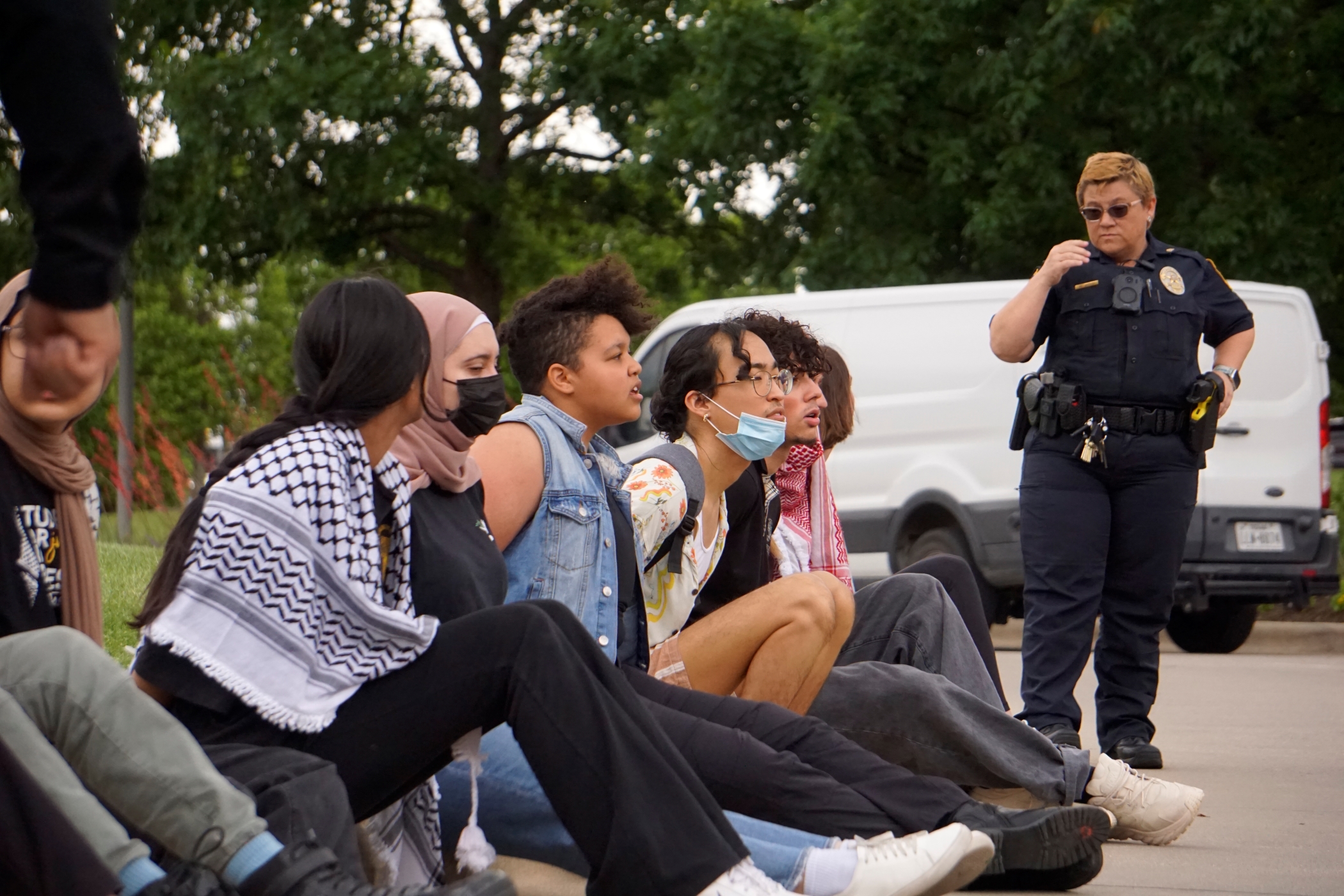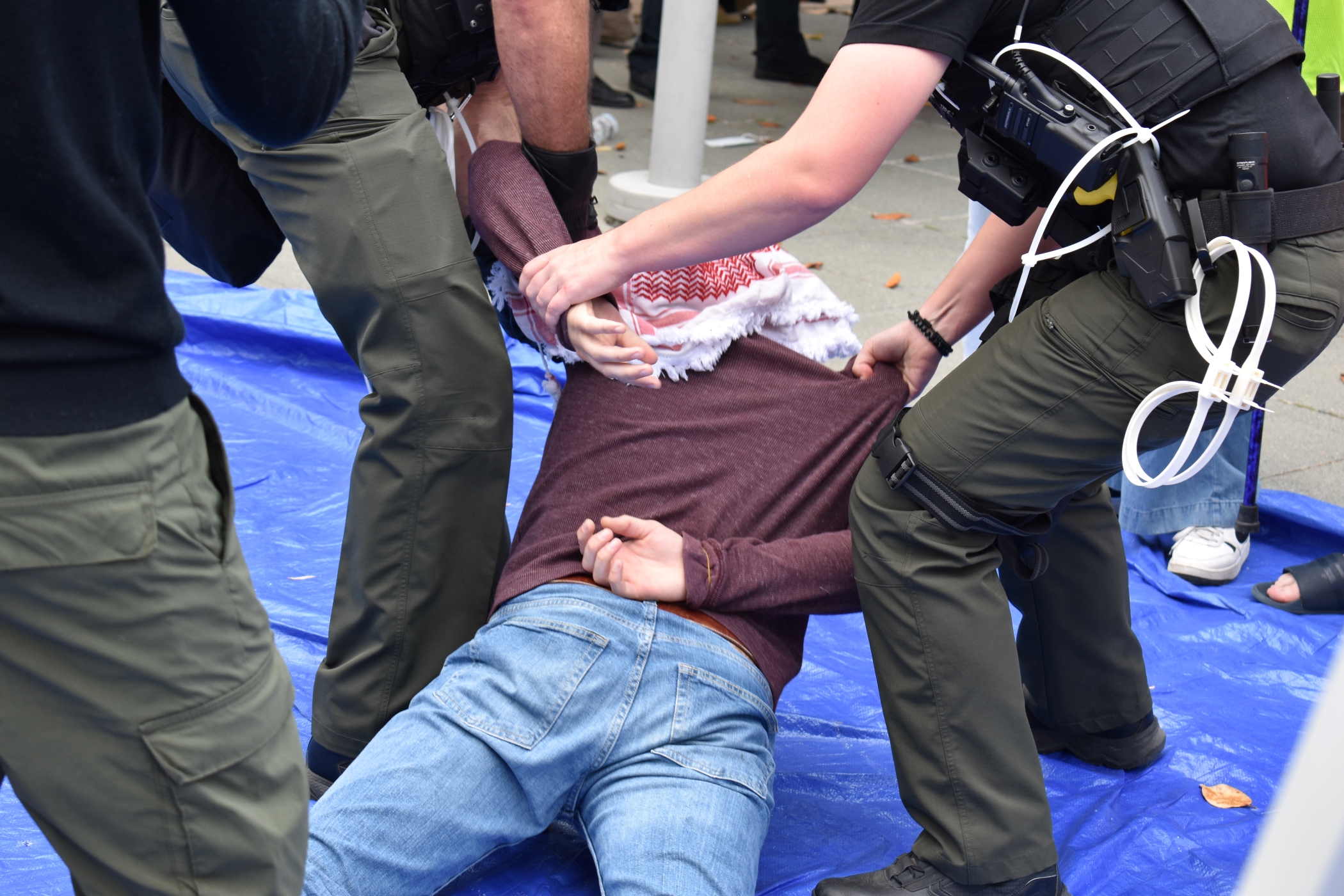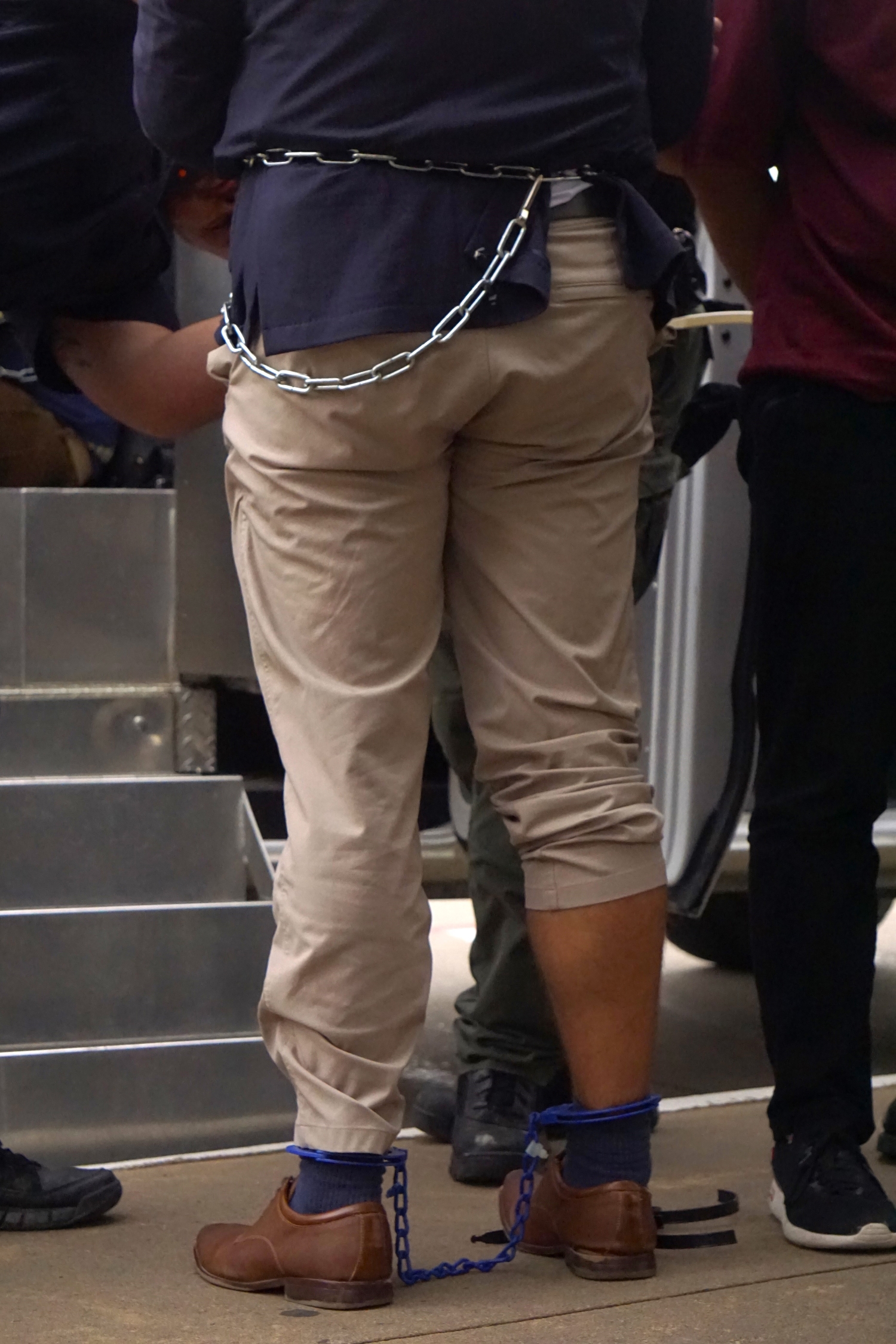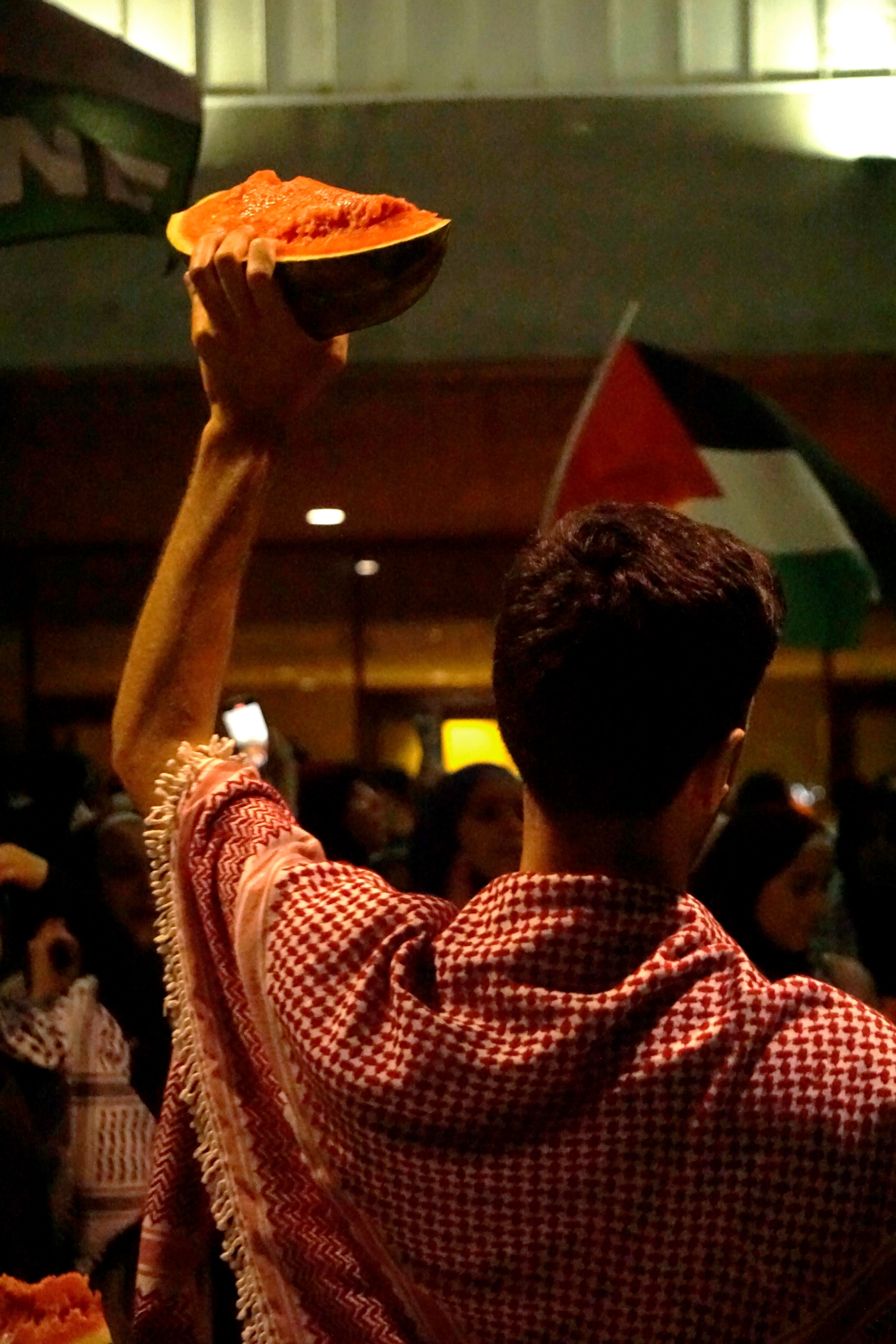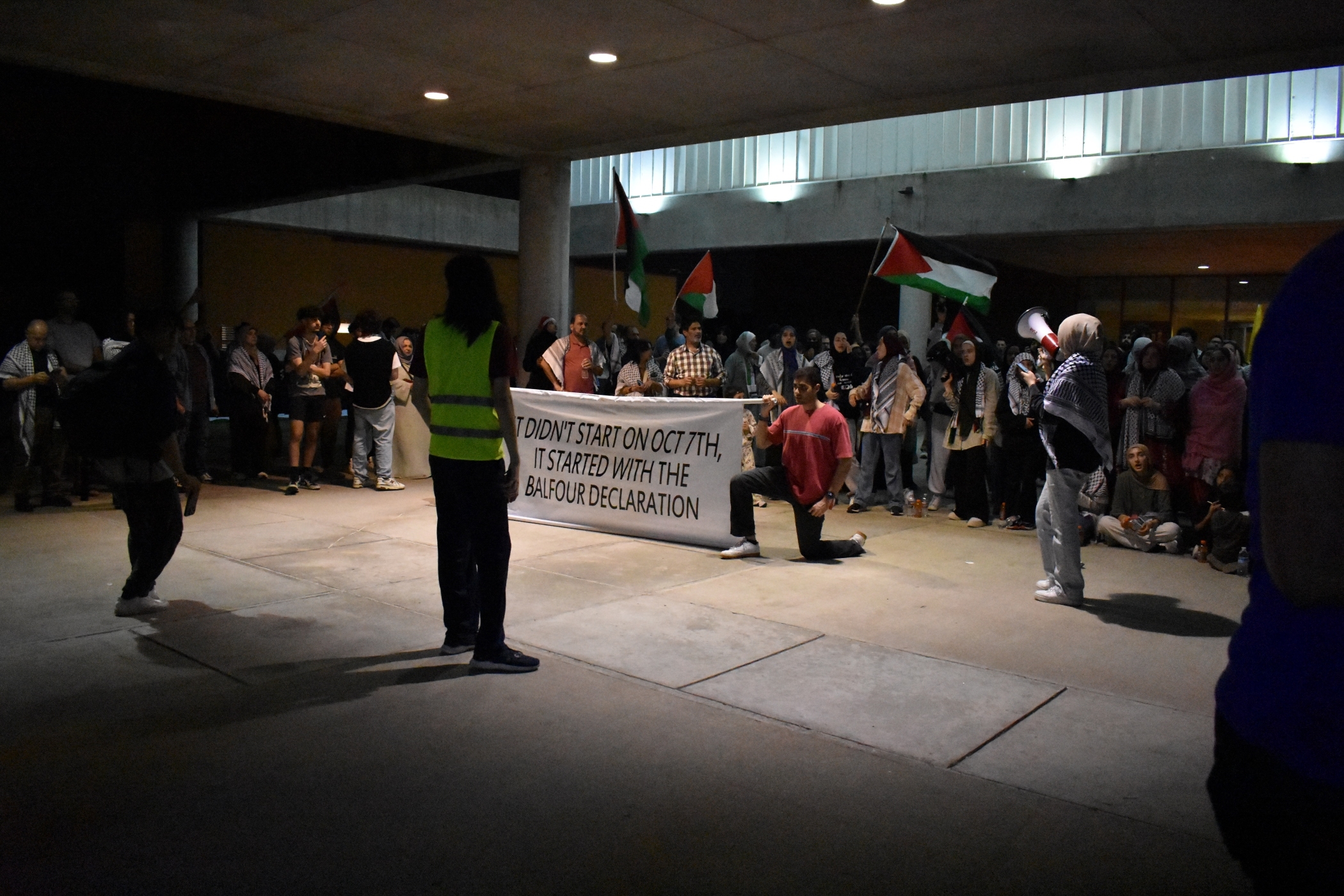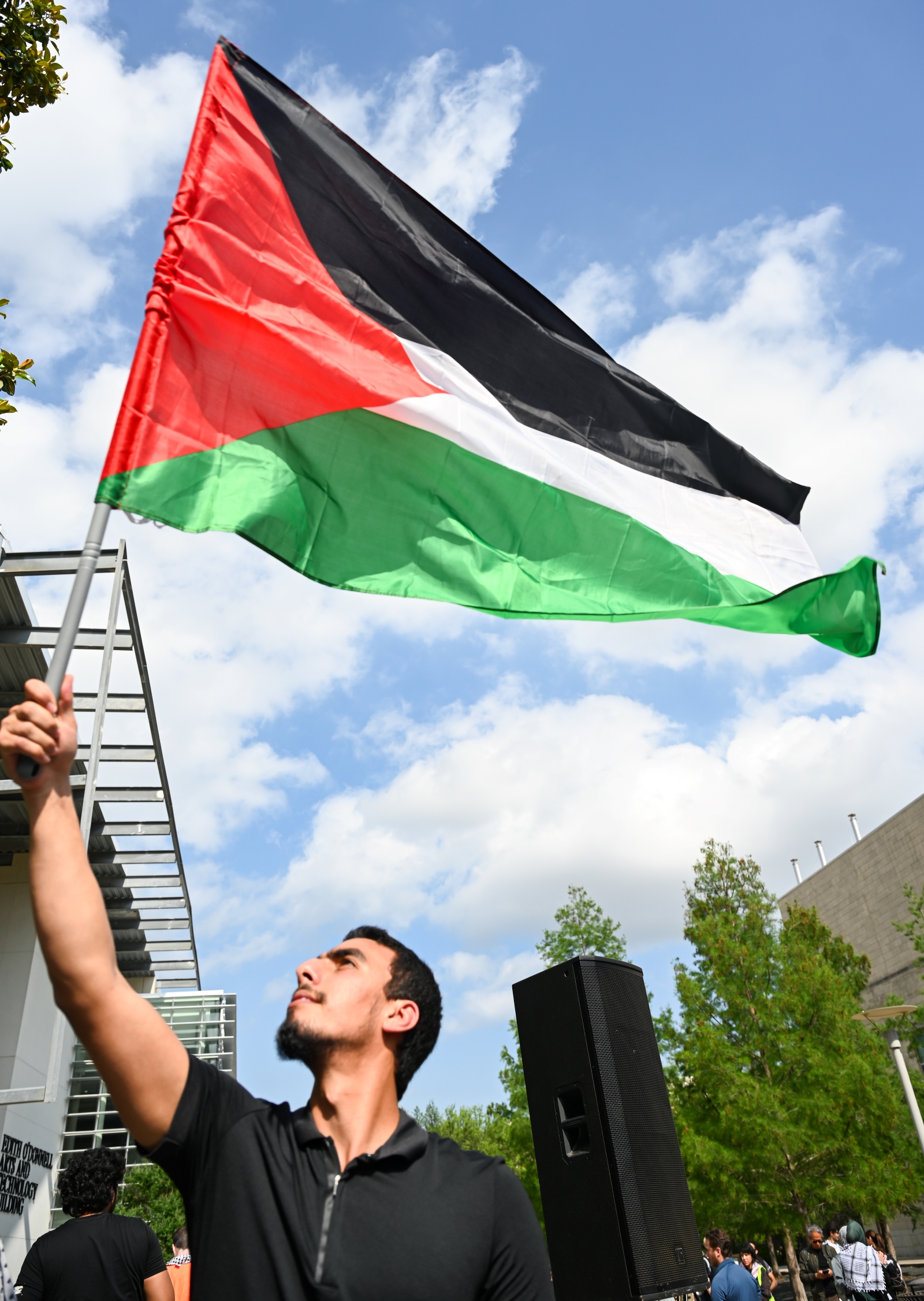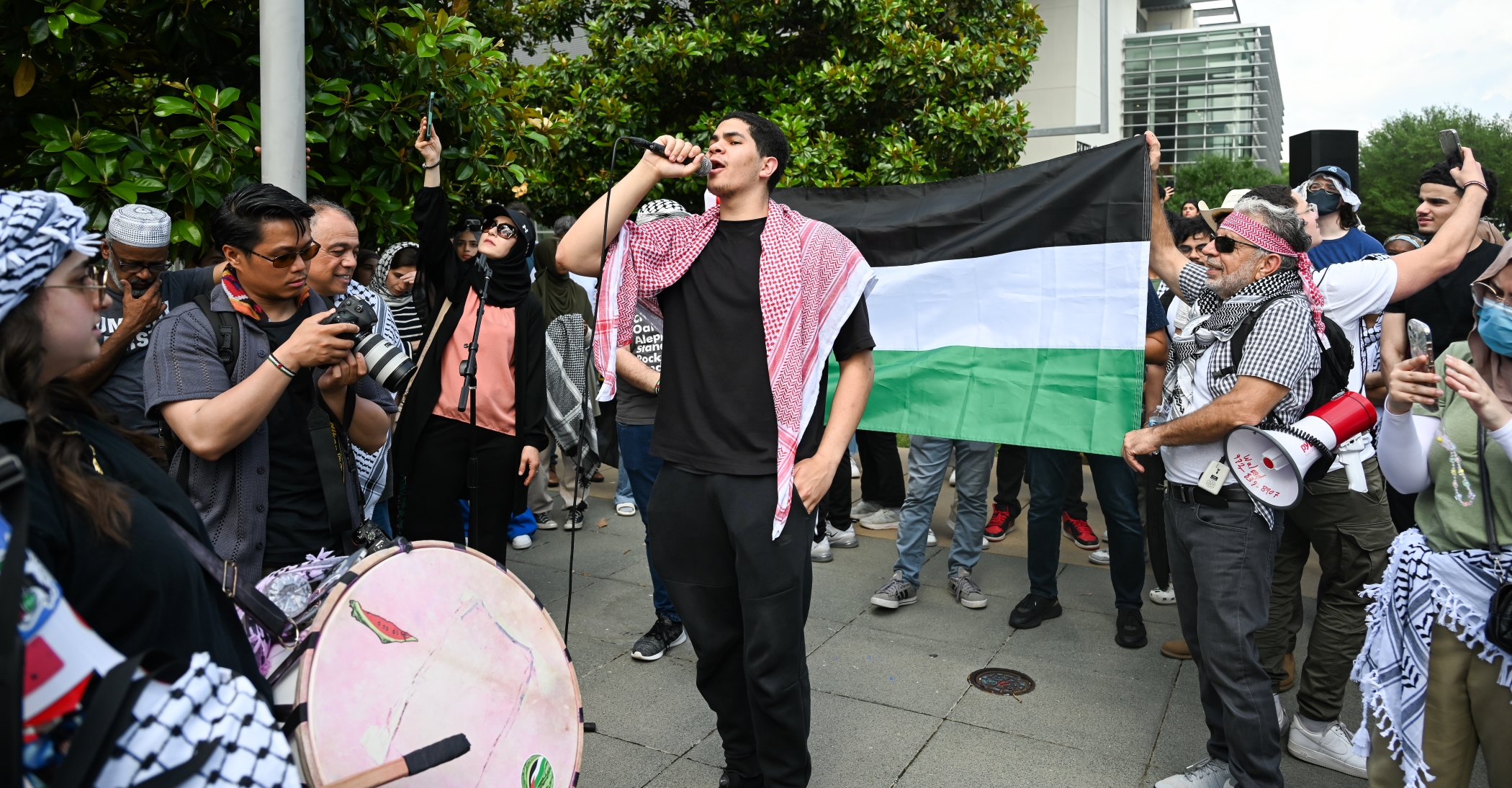In a historic first, UTD administration called in law enforcement with riot gear to destroy the “Gaza Liberation Plaza” encampment while arresting 21 students, faculty, alumni and community members. Despite outcry across the UTD community, administration has not responded to demands to drop legal charges and disciplinary action against those arrested.
Students for Justice in Palestine members established the “Gaza Liberation Plaza” at 4:30 a.m. May 1 in Chess Plaza to make three key demands. Those demands are that UTD divest from weapons manufacturers that support Israel, officially support a permanent cease-fire in Gaza and reject Gov. Greg Abbott’s executive order GA-44, which singles out groups like SJP for “antisemitic speech and acts.” Less than 12 hours after the initial formation of the encampment, law enforcement arrived on campus with riot gear and armored vehicles, destroying the encampment and arresting 21 students, faculty, alumni and community members for criminal trespass. UTD students and local community members protested outside Collin County Jail until every person was released on bond by 4:30 p.m. the next day. A crowd of approximately 150 people gathered directly outside of the Collin County Jail and protested throughout the entire night. Student activists, faculty, alumni, Student Government, community groups like the Islamic Association of North Texas and the North Texas Islamic Council and national groups like the Middle East Studies Association of America and academic groups have since condemned UTD’s decision to deploy law enforcement to dismantle the peaceful encampment and demanded UTD not penalize any individuals arrested.
The encampment was barricaded with tires, plywood and cardboard and housed tents, food and water supplies and a makeshift community library. Throughout the morning of May 1, encampment attendees participated in reading circles, chants, painting and prayers, with over 100 protesters in attendance by noon and 200 by 6 p.m. At 2:40 p.m., The Mercury received initial reports of state troopers’ presence on campus. At 3:45 p.m., encampment leaders read aloud the notice issued by UTD, which mandated the encampment be taken down immediately, but did not require protesters to disperse. An image of the notice, from the office of the Associate Vice President and Dean of Students Amanda Smith, was posted to SJP’s Instagram as part of their May 22 official statement. Campus administration has not provided a copy of the notice to The Mercury. The original notice is as follows:
“The setting up of an encampment — including tents, barricades, and other structures — is not permitted under the University’s Policy for Speech, Expression, and Assembly, nor is it permitted under any other University of Texas at Dallas or UT System Policy or Rule.
Individuals may peacefully assemble in the common outdoor areas of campus and exercise their right to freedom of speech, but individuals may not erect or maintain an encampment. Individuals are not permitted to block or obstruct passageways to facilities, including outdoor passageways.
This is written notice that all tents and structures must be removed immediately. Failure to comply with this instruction may result in removal for Criminal Trespass or other violations of state law and or sanctions under the Student Code of Conduct, as appropriate.”
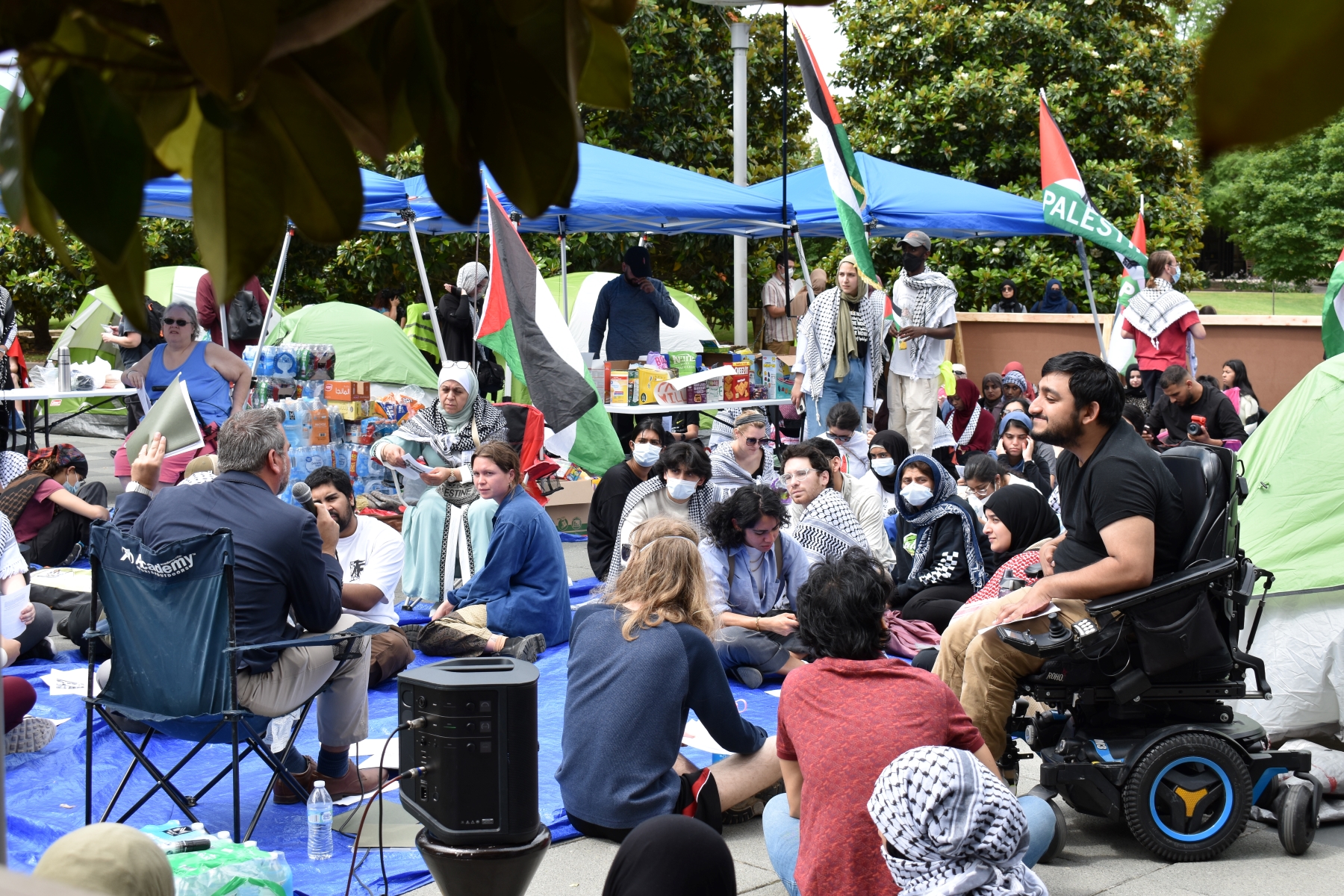
At 4 p.m., over 60 officers from five law enforcement agencies arrived in over 30 police vehicles, tearing down the encampment and arresting protesters. Officers restrained individuals with wire handcuffs and chains. By 5:40 p.m., a police vehicle and 16 officers with grenade launchers advanced on the destroyed encampment, after which encampment attendees left Chess Plaza and relocated to the Plinth, where the protest continued. Law enforcement arrested a total of 21 individuals including Associate History Professor Ben Wright, Assistant History Professor Rosemary Admiral, Assistant Art History Professor Ali Alibhai, SJP President Mousa Najjar and SJP Secretary Nour Saad, alongside seven other students, one UTD alum and eight community members.
“I was struck, as [law enforcement] was advancing, that they were not there to talk, they were not there to de-escalate, they were not there to do anything other than to arrest people and to destroy,” Wright said.
A Collin County Sheriff’s Office Deputy injured and struck the camera of Fox 4 reporter Blake Hanson with bolt cutters as Hanson attempted to film Alibhai’s arrest. The same deputy forcefully shoved a student protester off a wall in Chess Plaza. During the arrests, officers shoved protesters against the ground of Chess Plaza before handcuffing them and moving them into what Alibhai and Wright described as hot unventilated vans. Alibhai said that during his arrest, officers repeatedly attempted to flip him and throw him onto the ground. Alibhai said that officers kicked him in their attempts to knock him over before dragging him away.
“I just stopped moving because I just kept thinking ‘am I going to see [my wife] again, what is going to happen, is someone going to shoot me?’” Alibhai said.
After the notice was read aloud, Wright said he felt surprised administration did not provide students time to leave or negotiate, and that the policies referenced in the notice were unclear and unnamed. Law enforcement arrived 15 minutes after the notice was read aloud; UTD administration has not stated when the notice was initially delivered to student protesters. Throughout law enforcement’s raid on the encampment, seven counter-protesters stood nearby and waved an Israeli flag.
By 7 p.m., the Plinth demonstration dispersed with attendees relocating to Collin County Jail, where the detainees were held despite the encampment falling within Dallas County’s legal jurisdiction. Throughout the entire night, over 150 protesters outside the jail chanted, prayed and demanded the immediate release of all detainees. By 9 a.m. May 2, 50 protesters remained, including detainees’ family members. Alibhai, the first detainee to be released, exited the jail at 11:40 a.m. and the final detainee was released at 4:30 p.m.
Marwa Elbially, a volunteer attorney present at the jail demonstration, said individuals arrested for misdemeanors can typically be freed a few hours after their arrest through attorney appearance bonds. However, Collin County Magistrate Lisa Bronchetti issued an oral standing order preventing appearance bonds for criminal trespass — which the 21 arrested demonstrators were being charged with. Without the appearance bond, those arrested would only be released after their arraignment, which could happen as late as 72 hours after arrest. Wright said those arrested faced differing treatment from officials depending on their perceived religion or ethnicity.
“Our students wearing more Middle Eastern clothes or those with common Muslim names were asked far more difficult and probing questions [by the judge overseeing arraignment], and often were only given bond after paying $3,000,” Wright said. “Other students, and myself, were asked only two simple questions and released on a PR bond without having to pay a fee.”
A personal recognizance bond, or PR bond, allows individuals charged with a crime to leave jail without paying collateral, usually because of the connection the individual has with the local community. A typical bond requires payment to ensure the charged individual appears at their hearing. Bond money for those that required collateral was supplied by the Palestine Youth Movement.
“It was interesting to see the amount of bond the judge was placing on everybody,” Alibhai said. “While I don’t have that legal expertise, I found the amounts being placed for bonds were huge and I don’t know how people could ever pay this back. And of course, if you don’t pay your bond then you have to go back into the system. What kind of system is that, where if you have more money you get to stay in luxury?”
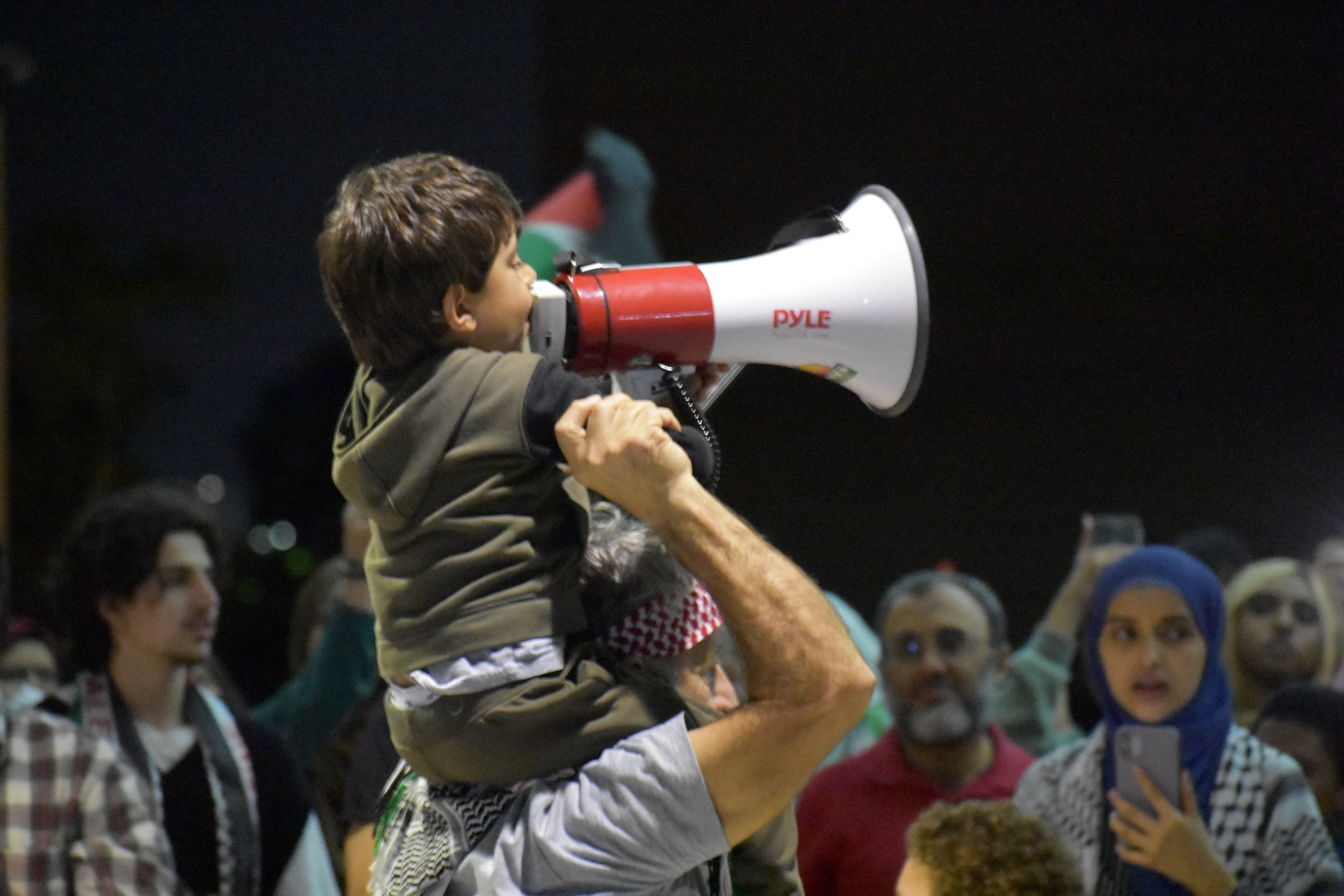
While held inside the jail, encampment detainees bonded with other inmates by engaging in academic conversations and discussing the inherent issues of the U.S. prison system. Officers refused to tell the detainees what time it was, according to Alibhai, on top of other harsh treatments and conditions like “freezing” jail cells and insufficient space for all the inmates to sleep. Alibhai said some jail staff were compassionate and kind, such as one officer who helped hijabi detainees cover their hair after having their hijabs seized during arrest.
“They do try to instill that fear into you since there is no clock, they try to turn you against the other inmates and separate you,” Alibhai said. “This lady [who helped provide hijabs] was nice and cognizant of us, but not everyone we dealt with was so nice. While some of the officers humanized us, others went out of their way to dehumanize us too.”
All 21 detainees are being charged with a Class B Criminal Trespass misdemeanor, punishable with a fine up to $2,000 or up to a 180-day jail sentence. Law enforcement officials performing arrests did not communicate the charge to detainees until approximately two hours after their arrest, according to Wright and Alibhai. Wright said arrested faculty’s release conditions state they can only be present on campus for “teaching classes and job-related activities.” Wright said that since the detainees’ release, UTDPD has been stricter than what the release conditions stipulate — for instance, UTDPD required that Admiral be escorted to and from her office. Wright said students have faced harassment since their return from Collin County Jail.
“I have a lot of students who I know would love it if I could attend their graduation, but the ambiguity of my bond puts me in a difficult situation,” Wright said. “It is hard to know how to celebrate in a moment which feels so sad.”
After the arrests, multiple groups published letters in solidarity with those arrested. The SG Executive Committee, alongside nine previous presidents and vice presidents, signed a letter May 2 demanding UTD drop all charges against arrested students and faculty and pursue no disciplinary action. As of May 15, over 100 faculty have signed an open letter with identical demands, which was blocked from mass-email circulation by UTD President Richard Benson. A letter signed by over 1,300 alumni May 3 echoes these demands and affirms the encampment protesters’ call for UTD to divest from Israel-backing military companies, reject GA-44 and support a permanent cease-fire in Gaza. The Islamic Association of North Texas and North Texas Islamic Council, along with 27 other community organizations and businesses, addressed a letter to UTD administration and city leaders May 3 demanding answers to questions, such as why Allen PD was involved in the encampment raid, why Bronchetti blocked appearance bonds without a written copy of the order and how state law enforcement will ensure students can “protest without fear of a militarized police response.”
“Our trust in Dr. Benson’s leadership and his ability to safeguard our students has eroded,” the IANT and NTIC letter said. “For the Islamic Association of North Texas in particular, this incident brought forth painful memories of when radical right-wing groups were protesting IANT, and when our community’s children were forced to walk to school between rows of right-wing protestors armed with AR-15s … Armed protestors threatening children outside of IANT were afforded more protection than students protesting peacefully on their own campus.”
At 8 p.m. May 1, Benson released a schoolwide email that said the encampment was removed for “[violating] institutional rules” about barricades and structures on campus, and that UTD “will continue to be a strong advocate for … free speech.” On May 9, Benson published an op-ed in The Dallas Morning News where he said no one was arrested for protesting, only for noncompliance with the university order to dismantle the encampment and leave.
“Regrettably, the encampment on May 1 differed from all of the protests that came before and after, thus prompting the university’s response,” Benson said in the op-ed. “Such an encampment constructed under the cover of night at the center of our campus, impeding faculty, staff and students from their daily tasks, is not protected by the First Amendment or our speech and assembly policies.”
On May 8, UTD Hillel held a press conference where Jade Steinberg, a psychology freshman and President of UTD Hillel, and supply chain management graduate Ofer Turjeman answered questions from media outlets like CBS and The Dallas Morning News about their discontent with the “Gaza Liberation Plaza.” Turjeman said she was upset when protesters told her they would not speak with her because of the encampment’s rules against interacting with Zionists. Steinberg said they viewed the Jewish students who participated in the encampment and past protests as “oftentimes antisemitic,” particularly because of what Steinberg saw as their association with the group Jewish Voice for Peace —an American Jewish advocacy organization that criticizes Israel. According to Steinberg, UTD Hillel has requested more UTD PD presence at its on-campus events and has begun removing some events entirely off-campus. When asked during the conference about the harassment they have faced on campus, Turjeman spoke about the Spirit Rocks.
“So, I was called a Nazi multiple different times,” Turjeman said. “The one that really stands out is when UT Dallas had the rocks on campus. In that instance, the Spirit Rocks were a way to really express speech or expression. And what the pro-Palestinian students topped on is ‘Zionism is Nazism.’ And in that case, I was called a Nazi when I walked by the rocks, and they saw me and that was absolutely terrifying and that was super uncalled for.”
On May 10, UTD’s Academic Senate convened an emergency meeting to discuss administration’s response to the encampment. Wright and Alibhai spoke at the meeting, while Admiral was absent attending a Fulbright program outside of the country. At the meeting, Wright — who was briefly present at the encampment May 1 — said it was still possible to navigate around the barricades with a 30-second detour. Wright and Alibhai spoke about their experiences and urged the senate to pass a resolution in solidarity with those arrested. Michael Kesden, associate professor of physics and speaker-elect of the Academic Senate, said administration became aware of the encampment around 6 a.m. May 1, when Vice President Rafael Martín visited it. Ravi Prakash, computer science professor and speaker of the Academic Senate, said Benson confirmed in a private meeting that no weapons were present at the encampment, nor were demonstrators violent. The Academic Senate passed a motion urging Benson to drop the charges and refrain from punishing the students and faculty.
“When I woke Wednesday and learned of the encampment, I raced to campus worried for these students,” Wright said at the senate meeting. “My fears were almost immediately assuaged. I found an impressive level of calm, commitment and organization — teams of legal observers, attorneys, and medical personnel were present and eager to exercise their rights within the great American tradition of peaceful civil disobedience. [The encampment] was the work of some of our brightest and most committed students.”
Wright and Alibhai both said they felt compelled to stand between the students at the encampment and advancing law enforcement. Both Wright and Alibhai said they hoped faculty’s presence would help de-escalate the situation.
“I just got there, and I thought that I was in some sort of movie or war zone,” Alibhai said at the senate meeting. “Everyone around me was chanting … They kept on saying, ‘There is no riot here, why are you in riot gear?’ With all the noise and commotion, I had this gut feeling that someone is going to get hurt. Someone is going to get killed.”
It is currently unclear who within UTD’s administration organized law enforcement’s arrival at the encampment. At the time of publication, The Mercury has not received a response from the Office of the President.
The Office of Communications issued a statement May 1, which explained UTD issued a notice to student demonstrators requiring them to dismantle the encampment, and that the rationale behind law enforcement’s arrival and arrests was to “ensure the safety of our students, faculty and staff.”
The Mercury has reached out to campus administrators multiple times for further details about on-campus encampment policies, law enforcement’s arrival and the arrests. As of May 24, administration has not responded to requests for comment.
The Chess Plaza arrests came two days after state troopers arrested 79 protesters at an encampment in UT Austin’s South Lawn and on the same day NYPD arrested 100 protesters occupying Columbia University’s Hamilton Hall. The encampment was the climax of a series of demonstrations from SJP — such as April 25’s sit-in at the Administration Building — which aimed to compel UTD administration to divest and support a cease-fire, and one of many pro-Palestine demonstrations that have occurred worldwide since Oct. 7.
“We should always tell our students that they are safe here to express their ideas, and I feel that that all changed on May 1,” Alibhai said. “I rushed to try and protect my students because my students and my colleagues are my strength, and even after this, I ironically still love UTD. I hope that we can learn from this and grow as an institution.”








